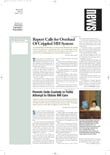The full of range of recommended psychosocial treatments for people with schizophrenia is rarely provided in routine psychiatric practice, according to results of a study from APA’s Practice Research Network (PRN).
Patients treated in the public sector under the Medicaid or Medicare programs and those over 65 years of age are especially unlikely to receive psychotherapy and other psychosocial treatments.
Of 151 adult patients with schizophrenia being treated by 615 psychiatrists in the PRN, 41 percent received both psychotherapy and medication; the rest received only medication. Moreover, more than half were receiving three or more different medications, and 14 percent were receiving five or more.
The PRN is a network of 788 psychiatrists who participate in clinical services research designed to provide a picture of “usual care” in the community. It was launched in 1993.
Lead researcher Joyce West, Ph.D., told Psychiatric News that it is not clear from the data what the indications are for the multiple medications patients are receiving. “We don’t know whether antianxiety medications, which were prescribed for 39 percent of patients, are being used to manage anxiety or treatment-resistant psychotic symptoms, since most of the patients were experiencing moderate to severe psychotic symptoms despite receiving an antipsychotic medication,” said West, the director of the PRN.
But the most striking finding from the survey is the relative rarity of almost every kind of psychosocial treatment recommended in APA’s guidelines for the treatment of schizophrenia, as well as in guidelines published by the federal Agency for Healthcare Quality and Research.
Only 38 percent of the 151 patients had case management, and only 21 percent were receiving cognitive-behavioral therapy. A mere 13 percent were receiving social skills training, and just 3 percent were receiving vocational training, despite the fact that 73 percent of the patients were unemployed.
West and other researchers involved in the study said that the structure and financing of the health care system in the United States and inadequate reimbursement to clinicians are primary obstacles to the provision of psychosocial services for schizophrenia.
“We have other data from a large, random sample of psychiatrists in the AMA Masterfile of Physicians showing significant financial disincentives to providing psychotherapy over medication management,” West told
Psychiatric News. “Psychiatrists are, on average, reimbursed 40 percent less if they provide psychotherapy compared with medication management” (
see box).
In the public sector, rates are not sustainable for many clinicians. For example, the Medi-Cal rate for a 45- to 50-minute outpatient individual psychotherapy session with medical evaluation and management is $49.22, West said. Medi-Cal is California’s Medicaid program.
Co-investigator Darrel Regier, M.D., director of APA’s Division of Research, said the problems with reimbursement and financing of psychosocial treatment point to “issues and problems that our entire health care system doesn’t deal with.”
He noted that psychosocial treatments are labor intensive. “Getting the people who have training in areas such as social skills training, occupational rehabilitation, and the range of social-support services needed to have families in support of the patient all require staff time that is often not reimbursed,” he said.
In the private sector, physicians often are not part of the kind of multispecialty group practices that can provide the range of social-support services necessary to meet recommendations. “That requires a level of coordination with a system of care that doesn’t exist,” he said.
In the public sector, reimbursement has largely moved away from “categorical” funding for services—which had allowed for some reimbursement to contract for specific psychosocial services—to a fee-for-service model, said Regier.
He added that for many of the recommended psychosocial treatments, it is not cost-effective for the psychiatrist to provide them, which means the clinician must “shop around” for the services.
“If you are going to treat this population, how are you going to align yourself with public or private services where these kinds of things are available?,” asked Regier.
As Regier noted, many studies of clinical effectiveness involve highly selected patients with little or no comorbidity. “The patient population in many studies doesn’t really reflect the real patient population in the community,” he said. “The idea of the PRN is that this is a laboratory of routine practice where you can look at how treatments have been translated into clinical care in the typical medical practice.”
West said that an important next step for the PRN will be longitudinal clinical-effectiveness studies tracking patients over time to look at the treatments they are receiving and how the patients respond.
She said the studies will look at patients who are getting recommended treatments to see how their outcomes compare with those who are not. Initial pilot studies are focusing on treatment of major depression.
“With new funding from the American Psychiatric Foundation, we hope to develop the capacity to look at outcomes of treatment for the full range of psychiatric disorders, including major depression, schizophrenia, and bipolar disorder,” she said. “We want to understand better some of the barriers, in addition to financing, to providing evidence-based recommended treatments.” ▪
